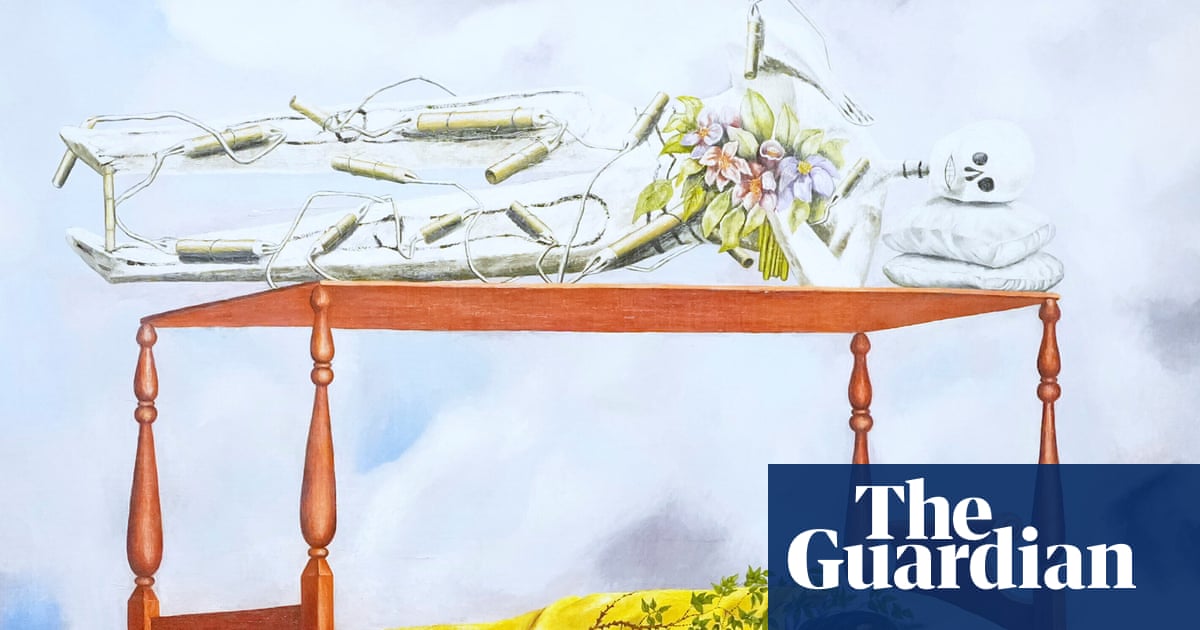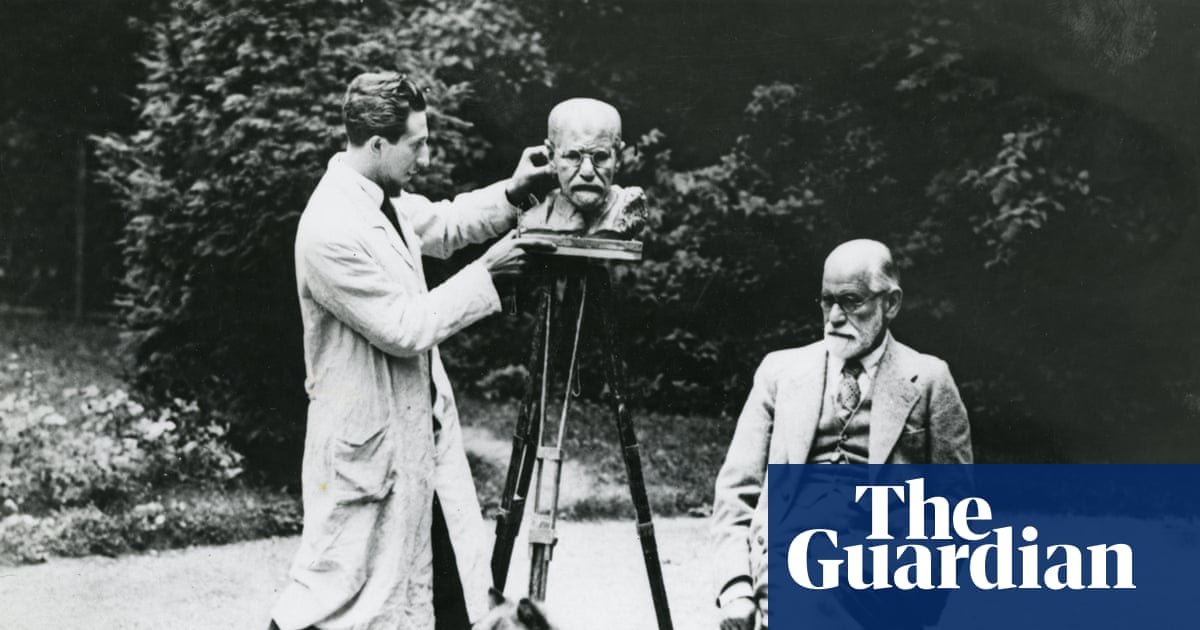When the entrance to a theatre in London’s West End was discovered to be smeared with blood and faeces one day in March, a distress call went out to the headquarters of Ben Giles, a 49-year-old veteran of the extreme clean, who is based in Cardigan in Wales. Decades earlier, as a young know-nothing, hired by police to clean vehicles, Giles laboured for hours to remove fingerprint dust from the interior of a stolen car – work that now, with the experience of innumerable litter-dashed, liquid-sodden, gunge-roped scenes, would take him about 30 minutes. Job by job, he figured out when to scrape or sand, soak or fog, preserve or dispose. Boilersuited and plastic booted, Giles learned how to eliminate most evidence of spillages, collisions, protests, haemorrhages, severings, explosions, fires and floods, becoming a self-taught stain savant, a walking database of remedies. When you have lifted a layered lasagne of toilet paper and semen from the floor of a submarine yard in Barrow-in-Furness, there’s not much left in the world that can scare you.
What exactly was the problem in the West End? Details were explained to one of Giles’s operators at the Cardigan HQ. About 4 o’clock that afternoon in March, a person had defecated in front of the Dominion theatre. Ticket-holders were due to arrive, very soon, for an evening performance of The Devil Wears Prada. When emergencies like this come in, Giles’s staff are meant to log whatever information is available on the office network. “Human waste at the front of the Dominion,” an operator wrote at 4.32pm, then, at 4.53pm: “Someone has splattered it on doors now.” A queue was expected to form any time after 6pm.
Giles, a handsome, weather-beaten, wedge-haired man, built up his empire from small beginnings. In his 20s he was a freelance window cleaner, 50p a pane, when one of his clients – a lady in Aberystwyth – asked if he would clear out a vacated property she managed. When Giles got inside he found a bathtub full to the brim with piss and turds. Asked how much he expected to be paid to empty all this, trowel by trowel, Giles quoted a random sum: £2,000. Later he realised he could have asked for much more. If a stain or a mess is repulsive enough, stubborn enough, enough of an obstacle to the sterilised good order of things, its removal is seen as a delivery of near-religious proportions.
He started Ben Giles Cleaning with a few mates in the late 1990s. As the company grew he changed its name to Ultima because – ultimately – his lot would try their hand at anything: roadkill, toppled bin lorries, smeared theatre doors, sure. With his trusted deputy, Mark Baxter, a suited, Croc-wearing Englishman, Giles started a training academy in the 2010s from which has emerged a vast corps of about 600 freelance cleaners he can call on for rapid deployment. A couple of these were sent to the Dominion with mops and buckets, arriving on the scene just after 5pm that March afternoon.
“And within an hour of the call it was done,” said Baxter, as he sat with Giles outside a bar in Paddington station. It was the week after the Dominion crisis. Giles and Baxter were fresh off the Carmarthen train, in London to meet executives at a conglomerate called Atlas, which absorbed Ultima a few years ago. That deal made Giles rich. He bought an Italian restaurant in Cardigan and a herd of shaggy Highland cows, entering a kind of partial retirement, kept on by Atlas as Ultima’s chief consultant, a professor emeritus of mess. By the spring of 2025 he had reached a reflective phase of life, with a self-published autobiography to his name and a new side hustle as a consultant on a TV show. Every day he was called on for tips, fixes, magic bullets.
At the same time as the Dominion crisis was unfolding, for instance, Giles was in his cow field at home, receiving texts from a graduate of his training academy. The ex-student was somewhere in the north-east of England, working on an entirely different job. “Can you help?” she wrote to Giles. “It’s solidified phlegm. Won’t wipe off.” Pictures, included in the message, showed a residential property where buds of tobacco-coloured spit were spread in appalling Vs over most of the walls, doors and ceilings. It looked as though a flock of starlings had settled in for a month. “Thinking of scraping or even sanding it,” the ex-student wrote, asking Giles: “What are your thoughts?”
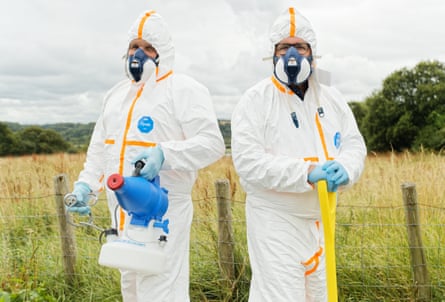
His thoughts? Mixed, mixed. Giles has cleaned in rooms containing skeletons in beds and armchairs, skeletons wearing leather belts, leather shoes, all that remains of someone’s clothing after a decade or more of undisturbed decay. He has dug out hoarders who’ve accidentally interred themselves, dying like pharaohs inside mausoleums of boxes, videotapes, magazines. He once collected hundreds of used needles from an abandoned train depot in Bath. Towards the end of that job, working in the dark, one of his colleagues disturbed an addict, who promptly added another needle to the total before wandering off. When a truck driver misjudged a hill in Devon, Giles’s office got the call to pick up hundreds of oily, slippery pig skins from the road.
He wrote back to the ex-student, for heaven’s sake, don’t sand off dried phlegm, you don’t want all that airborne. Instead, he suggested filling a mechanical fogger with a cleaning chemical called Byotrol 4-in-1 (a product that Giles holds in high regard), then setting the machine to output a fine mist. Let the phlegm soften, he advised, then wipe it away gently with a scourer or scraper. Another predicament sorted. Sitting outside the bar in Paddington station, Giles and Baxter recalled other closed cases: the burst vein on Christmas Day, the horse’s head dragged through a supermarket by a disgruntled employee.
Some jobs are logged as finished on the office network then forgotten about. Others are wild enough to earn a nickname as well as a place in the pantheon of tales that Giles likes to swap with Baxter to pass the time. “Do you remember Ratty Rolex?” he said. Oh, Baxter remembered. Ratty Rolex was a case that involved an imitation timepiece, a rodent-infested pit at the bottom of a lift shaft, and a security guard’s severed arm. I suggested that one day they might look back on the Dominion theatre job as Shit Play, but Giles and Baxter weren’t listening. They were discussing the time they arranged to clear a 20-tonne whale from Portsmouth harbour. That was on New Year’s Eve, 2019. When Giles saw the photos, he told Baxter, “Well, don’t say no.”
Friends telephone Giles all the time. They tag him on Facebook or they try to reach him through his grownup kids, wondering how to get rid of red wine spills, iron burns, spots of wee. Stains are stubborn truth-tellers. They remind us that we are animals, beholden to life’s disorderly processes. We come into this world streaked and matted. We puke, piss, shit and bleed for as long as we’re here. Odds are we depart with some ghastly final eruptions, too. It isn’t always nice to think about. One of the reasons Giles gets paid is so that not everybody has to.
What registers as mere dirt or damage to most of us – a blot on the ideal of a wipe-clean world – might be inspiring, life-changing, fortune-making to others. The poet Elizabeth Bishop was moved to compose one of her loveliest phrases by a patch of rot. She observed the way a damp wall seemed to be marred by “mildew’s ignorant map”. Connie Francis went top five in the charts with a 1959 breakup song about a lipstick smudge. “You said it belonged to me … then I noticed yours was red, mine was baby pink.” In 1994’s Pulp Fiction, Quentin Tarantino gave his gore-sodden killers, Jules and Vincent, some immortal dialogue about cleanliness. Vincent: “Blood’s real hard to get off.” Jules: “I used the same fuckin’ soap you did, and when I got finished, the towel didn’t look like no goddamn maxi-pad.” A few years after Pulp Fiction’s release, Monica Lewinsky left a function at Bill Clinton’s White House with marks on her dress that she dismissed, at first, as spinach dip.
If you see the world through stains, you see questions to be matched with answers. “Mildew’s ignorant map” can be treated with a bleaching agent, sodium perborate. For lipstick on your collar, work in Vaseline, then sponge the stain with a grease solvent, carbon tetrachloride. Never apply hot water to blood because that will set the stain, Lady Macbeth-ing it. I learned some of these methods from Giles, and others from a wartime pamphlet, Stain Removal from Fabrics, written by Margaret Smith Furry, an American textile chemist and a foundational figure in the cleaning industry. Furry did not have anything to say about semen in the 1940s, but by the 21st century the Good Housekeeping Institute was ready to offer a joke about Clinton, then a page on the subject in its handbook Spills, Spots and Stains.
It was Giles’s luck, as a child, never to pick up any squeamishness towards spills, spots or stains. If anything, he was affirmed in opposite habits. His parents were self-sufficient farmers. Giles, the middle of three children, grew up “smelling like a used wheelie bin”. He was a kid who once dragged animal droppings across the family carpet, grinding in the pieces as he pretended to be a farmer fertilising a field. Shortly before one of his grandmothers died, she surprised him by recalling she’d cleaned up after dead people. “I used to get first pick of the antiques,” she told Giles, who marvelled at the coincidence. “Subconsciously, was this the reason I went into this line of work?” he wrote in his memoir, The Life of a Crime Scene Cleaner. “Or the reason I could do it with ease?”
Giles has plucked translucent body lice off the upholstery of cars. He knows, from intimate exposure, the difference between picked, dried snot and that looser liquid gush brought about by the deployment of pepper spray. He has dealt with the flakes from impetigo sores. “And if someone has defecated themselves …” He paused. “Are you alright to talk about this while you’re eating?”
It was breakfast time in Cardigan, a fine morning in May. We were enjoying a breakfast of bacon sandwiches. I nodded for Giles to continue.
He said, “The fine line is where a stain’s worth removing. A pillow covered in blood I won’t even attempt, that’s straight in the bag for disposal. In vehicles, everything’s more expensive to replace. When your driver has vomited over the air vents, it’s a massive task.”
Furry’s fundamental rule, endorsed by Giles, is that a stain or a mess must be tackled from the outside in, to avoid spread. He learned this for himself while contesting a mop-off in a Welsh police station. Early in his career, Giles was trying to win a valuable tender from the local police force. He noticed that every time his rival for the job went in and out of a urine-splashed cell, he trod around pissy footprints, enlarging the task at hand. Giles went down on all fours, inching forwards from the corridor.
For the rookie cleaner, Giles told me, there is no better place to be than a soiled prison cell. Cells are where he now sends trainees, rather as you might post a young diplomat to Geneva, there to learn a bit of everything. From this experience emerged what he calls, partly in jest, the Giles Method. He tells his students to refer back to the method’s first principle: “Everything in front of you is dirty. Everything behind you is clean.”
After breakfast we walked through Cardigan, on our way to visit company headquarters. I have always been an unusually attractive landing place for stains – candle wax, tea, toothpaste, chicken fat – but by some miracle I ate that bacon sandwich without spilling any ketchup or grease down my front. Now, as Giles swept aside a large flowering weed that had grown across a path, it brushed across my sweatshirt, leaving a streak of yellow pollen.
Giles didn’t notice. He was talking about that whale, back in 2019, struck and killed by a cargo ship, then carried into Portsmouth harbour folded over the bow. In photographs the carcass resembles a vast, grey rubber glove, 22 metres in length. Giles and Baxter formed a plan to heave it off the harbour tiles intact, until someone sent them a YouTube video in which a whale in a similar state of gassy decomposition exploded.
Without the relevant experience to call on, Giles said, “You’ve got to create a method.” In the case of the whale they decided on dismemberment in place, dispatching a small team with knives and later endorsing their purchase of a motorised saw to cut through the awesome jaw bone. The pieces were eventually taken to a rendering plant, leaving great lakes of blubber on the quay to be mopped with absorbent medical pads. Throughout this, Giles never left Wales, tempted though he was to drive to Portsmouth with a fishing rod. “For the photo,” he explained.
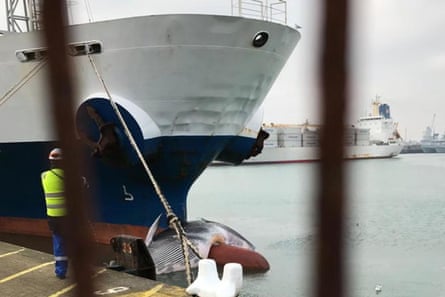
When he does go out on a job he wears the uniform of his crew, the white or pale-blue suits made of waxed paper, the top half of their faces covered by visors or goggles, the bottom half, special masks that filter out odours and particulates. The idea is to dull the senses: no smells, no tastes, a calming wall of clear plastic put between the eyes and some puddle or splatter or pile. Giles likes his gloves on the thin side, wearing two on each hand, for a balance between dexterity and safety. He and his cleaners go out like Batmen, Bonds, tooled up with specific equipment – skill saws, spades – just in case. Tweezer-like pickers are used to collect hypodermics. He always advises students to keep one arm behind their back. “Because I’ve seen it happen. People pick up a needle, they go to put it in a bag, they stab themselves.”
In the years since Giles started his company, a culture of corporate-style procurement has taken root across the cleaning sector. “Now we’re dealing with ‘facilities management teams’. It used to be Brian-in-a-boilersuit.” As recently as the 2000s, it was common practice for British fire brigades to finish up at road accidents by hosing human blood down the drain. Viruses can go on living outside the body for days, however, and as this became more commonly understood, expectations changed. So did Giles’s equipment.
He used to show up at crime scenes and other disasters with terry towels and a bottle of Dettol. Then biohazard and trauma-scene cleaning became a growth industry in the US and products improved, becoming more specialised, one liquid to deal with soot, another for smoke, another for grease, and so on. Cocktails of cleaners and sanitisers were brewed and given names like government reports or gentlemen’s hair dyes. For a while, Giles favoured Formula 429, giving this up for something called 49-Plus, then Byotrol 4-in-1. He and Baxter have collaborated with chemists on bespoke liquids, their favourite an acidic, practically volcanic cleanser that helps burn human waste out of bathtub enamel. They called it Scum Off, a private joke – a reference to a Dutch urine remover that was once brought to market with a similar name.
We arrived at headquarters, hidden on a leafy industrial estate outside the town centre. In an office area there is a cartoon portrait of Giles, drawn by one of his academy graduates. In the portrait, he clutches a fogger in both hands, pointing it as if it were a flame-thrower or a proton-blaster from Ghostbusters. Foggers are a must because sanitisers, deodorisers and pesticides are more effective on certain stains when applied in misty gaseous form, either hot or cold. Giles preaches “the five-minute dwell”, that is, giving a chemical time to settle and take effect. In a large storage room there were foggers, vacuum cleaners, handleless mop heads laid out on a rack like cabbages. Washing machines droned beneath a window with a view of the outside wheelie bins.
We paused in front of shelves crammed with 4-in-1. “Eats blood,” said Baxter, approvingly. Giles nodded.
Blood is his most commonly faced stain, every pool, every print, every rivulet seeming to tell a uniquely troubling story. Specialist cleaners don’t want to be called back to the same blood twice, because these stains can be the hardest on the nerves. Blood day on Ultima’s training course tends to winnow out a few from each group. “That’s me done,” someone will say, as a bucket is fetched in. Giles tells them, if blood has pooled on a carpet, cleaning is hopeless, cut it out. In 2018, he went to war with the National Carpet Cleaners Association (NCCA) over the matter. The NCCA argued that, in fact, carpet stains could always be cleaned. The stalemate was resolved when Giles and Baxter hired a conference room in Bristol, made some chipboard floors, covered them in underlay and carpet, then poured on pig’s blood. Photographs from the day show frowning association men, writing in their notebooks, being taught a thing or two.
We drove along green, blooming roads to visit Giles’s parents, Anne and Gray, at their farm. Ordinary English urbanites, they moved to rural Wales in the 1970s to try their hand at farming. They were poor – as Anne put it, life on the farm was “all hands on deck”. Chickens had to be plucked and rabbits skinned. Butchered animals usually filled the family freezer. From an early age, Giles knew what it was like when a lamb died inside its mother’s womb. He knew the tendons to pull when playing around with the foot of a chicken, trying to make the claws open and close. When we met Gray on the drive outside the family farmhouse, father and son embraced. Soon, they were reminiscing in familiar terms. “Remember that guy up in the field?” said Giles. “Three of his fingers came off in the silage machine. We found two of them, didn’t we? And you sent me to the shop to get ice pops to keep the fingers cold.”
Gray wanted his son to have a quick look at the family JCB. Giles was dressed in smart leather shoes, pressed jeans, a woollen jumper dyed a delicate sky blue. After only the slightest hesitation he climbed on to the tractor’s front bucket, pulling away a rusted, filthy grill plate.
There are stains we cannot avoid, because of obligation, because of love. There are stains we choose not to mind, like the coffee rings on books. Some people preserve stains as warnings. A US talkshow host, Seth Meyers, keeps the inky black spider of an exploded ballpoint pen on his office wall, a reminder to try not to lose his temper again. The stain is a potent metaphor in our language, because it is a visible reminder of a past misfortune or mistake that is hard to erase. A person’s character is said to be “stained” when they’ve put at serious risk the possibility of redemption or forgiveness, “indelibly stained” if these forms of expungement are beyond them.

When Giles’s Cardigan restaurant was robbed last year, police gathered evidence by covering the place in a powdered black substance called amido that stops liquid moving. On that occasion, the gods of mucky floors colluded to reward Giles for a career of loyal service. Coming in and out, the burglars must have spilled some beer and police identified the beery footprints using their powder, later making arrests. Amido can be hard to get rid of. Giles told the visiting officers not to worry, he’d seen worse, way worse.
It is often the case that a person’s bowels will open at the point of death. Bladders too. Fatal haemorrhages can mean seven or eight pints. The bodies of big, heavy people tend to inflate. If they burst they’ll soak whatever’s around in liquified body fat. Once, a man died in a plastic paddling pool – that was helpful. On another occasion Giles attended the death of a worker in a timber plant. On the threshold, a forensics officer said, “This is an interesting one, there’s a big bit of him up there, some of him over there, some over there …” But Giles was more interested in the fact that the floor of the plant was covered in sawdust, an absorbent, which would make the clean-up about 50% faster.
“Ben’s never shied off,” said Gray, as we stood outside the family farmhouse. “You’ve got to be a certain personality to do what he does.” Gray added that he didn’t think he could cope in a similar line of work, mentioning, by way of example, the day his own mother died. It happened a few years earlier in the building behind us, an upstairs room. “I couldn’t deal with that,” Gray said. Giles dealt with it. “I helped the undertaker put her in a bag,” he explained.
Because there is no such thing as half clean – half clean is dirty – to see the world through its stains and messes is an all-or-nothing proposition. Giles has the fizzy, compulsive restlessness of a room-neatener, the urgency of someone in a rush. He has been a Jehovah’s Witness for most of his life and, as we spent more time together, I sometimes thought I saw glimpses of his worrying eye, the world being contingent, bound to end in ruin and wreckage before long. “I hate procrastinating,” he said. “I just think, get it done, get it done, get it finished.”
Trying to right disorder, right away, allowed him to defer any reckoning with meaning. Giles experienced this vividly, he said, when one of his children was diagnosed with cancer. His mind went to hospitals, accommodation, transport. And only when these logistics were fixed in place, that avenue of distraction exhausted, did he implode and start weeping. (His child made a full recovery.) Gray said, “You seem to be able to tell yourself, ‘There’s a job here. Sort it out. Then I’ll get emotional.’”
“Maybe,” Giles answered.
From the farm we drove to Mwnt, a beach about two miles away. Giles spent a lot of time on this beach, growing up. It was while watching dolphins swim off the shore that he felt the earliest stirrings of religious belief. “I really think that my faith, and my amazing wife and kids, have been the stabilising foundation that’s got me through lots of what I have seen and experienced,” he wrote in his book. As we sat in the car, Giles said that quite a few Jehovah’s Witnesses in his community worked as cleaners of some stripe. He met Baxter, his trusted deputy, at church. The flexible hours of cleaning suited the volunteering that is an insistent part of the religion.
He told me he has been tempted, when faced with grieving families, to direct them towards scripture. He resisted: “I would hate for anyone to feel that I was using that opportunity to take advantage of them.” Instead, he depends on other releases, methods of self-preservation that go beyond the paper suit and gloves and the one-armed needle pick. After Giles attended a forklift accident in a carpet factory, he had to drive home blasting Def Leppard, trying to expel what he’d witnessed.
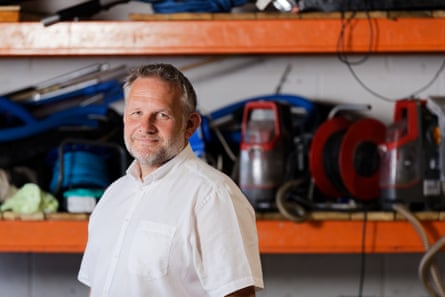
If you start to see the world through its stains and messes you cannot give back this special insight, an understanding of the human experience that is both privileged and discouraging. Giles would advise, where possible, to try not to die beside a radiator or an electric fire. The quickest postmortem clean-ups happen outdoors, on arterial roads, where a balance must be struck between respect, public safety and getting backed-up traffic moving. He can identify the sound of maggots eating a corpse: “Like the sound you hear when you push saliva in and out of your teeth with your mouth closed.” He was jet-washing the front of a train, once, when a dismembered hand fell down from under the skirting. He has scoured the pebble-dashed exterior of a farmhouse, trying to differentiate body matter from protruding jewels of red granite.
Giles was called to the scene of a murder a few years ago, and directed to remove a woman’s blood from window blinds, door handles, the inside of cutlery drawers. The woman had been killed by her husband. The part Giles couldn’t fathom, then or now, was that when they found the guy he was sitting in his local pub. Giles’s wife, Linz, told me that that was the only time she’d really worried about his mental health. Linz was stood in her own kitchen when she described to me all the places where Giles found blood. She ran a finger under the kitchen counter. She gestured at the sealed circular rim of the washing machine, the little sink lights. “For days, he couldn’t talk about it.”
He told me he only started contemplating the psychological impact of all this when he sat down to write his book. “Balcony in Tenerife, glass of white wine, and I’m almost in tears, thinking about it.” He wasn’t sure it was helpful to dwell. He has to be able to touch anything, treat a carcass like a carcass, never seeing the consciousness that resided there earlier. Coming away from Mwnt beach, Giles seemed a little overwhelmed by the effort.
As we drove, he quoted Genesis, as if to remind himself of fundamentals: “For dust you are and to dust you will return.” Between those times, we sweep up. We scrub. We pass around panaceas for stains and we tell each other that almost any mess can be corrected. Let streaks of mud dry, then scrape. Treat oil paint quickly – use turps. Be literal and work a rubber eraser over pencil marks. Soap and sunshine are supposed to be effective on spilled coffee. Salt ink. Salt mucus too. Giles must have seen me fiddling with the yellow pollen stain on my sweatshirt. “Don’t rub it,” he advised. “Vacuum out as much as you can. Most pollens are acids, so you’ll want an alkali cleaning product next.” He listed a few.

 3 months ago
113
3 months ago
113






